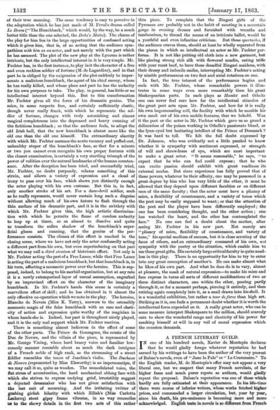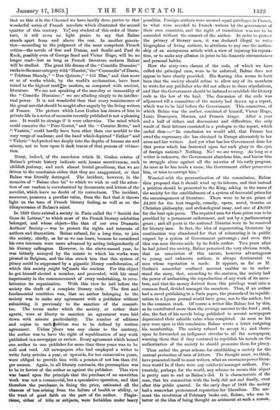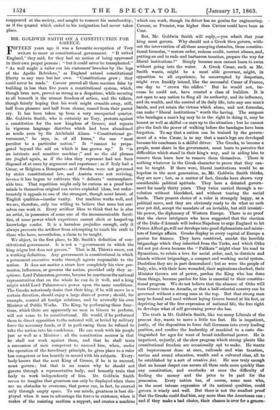A FRENCH LITERARY GUILD.
IN one of his hundred novels, Xavier de Montepin declares that he would gladly forego whatever reputation he had earned by his writings to have been the author of the very poorest of Balzac's novels, even of "Jane la Pale" or" In Centenaire." To the English reader, M. de Montepin's offer may not appear a very liberal one, but we suspect that many French novelists, of far higher fame and much purer repute as authors, would gladly repeat the proposal. Balza,c's reputation was one of those which hardly are fully estimated at their appearance. In his life-time there were scores of inferior writers, whose works fetched higher prices, and commanded a larger circulation, but; year by year, since his death, his pre-eminence is becoming more and more acknowledged. English taste in novels is so (Efferent from French that on this side the Channel we have hardly done justice to that wonderful series of French novelists which illustrated the second quarter of this century. To: any student of this order of litera- ture, it will seem no light praise to say that Balzac stands apart from and above the rest. In another genera- tion—according to the judgment of the most competent French critics—the novels of Sue and Dumas, and Soulie and Paul de Kock, possibly even of George Sand and Victor Hugo, will be no longer read—but as long as French literature endures Balzac will be studied. The great life drama of the " Comedie Humaine" ranks in the same category with "Hamlet," the "Commedia" of Dante, "Tristram Shandy," "Don Quixote," "Gil Bias," and that score or so of works which, by the world's acclamation, have been raised to the highest rank:in modern, as compared with ancient, literature. We are not speaking of the morality or immorality of the "Comedic Humaine ;" we are alluding simply to its intellec- tual power. It is not wonderful then that every reminiscence of the great novelist should be sought after eagerly by the living writers of France. The picture which Leon Gozlan has drawn of him in private life in a series of memoirs recently published is not a pleasing one. It would be strange if it were otherwise. The mind which could conceive the "Pere Goriot," and the " Cousine Bette," and " Vautrin," could hardly have been other than one morbid to the very verge of madness; and the hand which depicted "Esther" and " Valerie " had probed too deeply into the depths of human sin and misery, not to bear upon it dark traces of that process of vivisec- tion.
Many, indeed, of the anecdotes which M. Gozlan relates of Balzac's private history indicate such insane secretiveness, such childish jealousy, and such almost brutal greediness, that we are driven to the conclusion either that they are exaggerated, or that Balzac was literally deranged. The incident, however, in the memoirs of " Basile chez lui" to which we wish to call the atten- tion of our readers is corroborated by documents and letters of the novelist, which leave no doubt of its correctness. The incident, moreover, possesses a peculiar value, from the fact that it throws light on the tone of French literary feeling, as well as on the idiosyncrasies of Balzac's mind.
In 1839 there existed a society in Paris called the " Societe des Gens de Lettres," to which most of the French literary celebrities belonged, and whose object—like that of our own Dramatic Authors' Society — was to protect the rights and interests of authors and dramatists. Balzac refused, for a long time, to join the society, chiefly, as far as we can learn, because he considered his own interests were more advanced by acting independently of his literary colleagues. However, in the above-named year, he was bitterly annoyed by the extent to which his works.were pirated in Belgium, and the idea struck him that this system of piracy could be suppressed by a gigantic library confederation, of which this society ,might be:made the nucleus. For this object he got himself elected a member, and proceeded, with his usual impetuosity in the commencement of every undertaking, to revo- lutionize its organization. With this view he laid before the society the draft of a complete literary code. The first and fundamental condition was, that no author belonging to the society was to make any agreement with a publisher without submitting it previously to the sanction of the commit- tee. The terms under which the society, or rather their agents, were at liberty to sanction an agreement were laid down with minute particularity. The number of editions and copies in each /edition was to be defined by written agreement. Unless ;there was any clause to the contrary, the author was to have the right of republication of any work published in a newspaper or review. Every agreement which bound one author to one publisher for more than three years was to be null and void. All newspapers who had employed a writer to write forty articles a year, or upwards, for ten consecutive years, were obliged to provide him with a pension of not less than 48/. per annum. Again, in all literary contracts, the presumption was to be in favour of the author as against the publisher. This view was based upon the principle that the purchase of an unwritten work was not a commercial, but a speculative operation, and that therefore the purchaser, in fixing the price, estimated all the chances of loss arising from the failure of health or ability, or the want of good faith on the part of the author. Plagia- risms, either of title or subjects, were forbidden under heavy penalties. Foreign authors were secured equal privileges in France, to what were acceded to French writers by the government of their own countries, and the right of translation was not to be conceded without the consent of the author. In order to protect the privacy of literary men, it was declared illegal to write biographies of living authors, to attribute to any one the author- ship of an anonymous article with a view of injuring his reputa- tion, or to make any allusion in print to his domestic circumstances and personal habits.
How the sixty-two clanses of the code, of which we have culled the principal ones, were to be enforced, Balzac does not appear to have clearly provided. His floating idea seems to have been that the society should refuse to allow any of its members to write for any publisher who did not adhere to these stipulations, and that the Government should be induced to establish the literary code as the law of the land. The discussion of the code was adjourned till a committee of the society had drawn up a report, which was to be laid before the Government. This committee, of which Balzac was the author, consisted of himself, Victor Hugo, Louis Desnoyers, Meruau, and Francis Arago. After a year and a half of delays and discussions and difficulties, the only result of their labours consisted in a prologue to the report, which ended thus :—" In conclusion we would add, that France has owed the supremacy she has obtained in Europe alternately to her arms and her writers. And yet what has her Government done for that power which has bestowed upon her such glory in the eyes of foreign nations? Nothing. No! we are wrong. As long as a writer is unknown, the Government abandons him, and leaves him to struggle alone against all the miseries of his early progress. As soon as he has made a name, the Government either persecutes him, or tries to corrupt him."
Wearied with the procrastination of the commission, Balzac then proposed that it should wind up its labours, and that instead a petition should be presented to the King, asking in the name of the society for the establishment of a system of decennial prizes for the encouragement of literature. There were to be six prizes of .24,000 for the best tragedy, comedy, opera, novel, treatise on Christian philosophy, and archmological essay, and one of £8,000 for the best epic poem. The required sum for these prizes was to be provided by a permanent endowment, and not by a parliamentary grant ; and all posts in the national libraries were to be reserved for literary men. In fact, the idea of regenerating literature by combination was abandoned for that of reinstating it in public respect by a system of Government patronage ; and even this idea was soon thrown aside by its fickle author. Two years after he had joined the society, Balzac perceived the very obvious truth, that an association of this nature, however advantageous to young and unknown authors, is always detrimental to men whose reputation is made. It appears, as far as M. Gozlan's somewhat confused account enables us to under- stand the story, that, according to the statutes, the society had the power of authorizing the reproduction of any work of its mem- bers, and that the money derived from this privilege went into a common fund, divided amongst the members. Thus, if an author had a novel publishing in a Paris paper, the proceeds of its republi- cation in a Lyons journal would have gone, not to the author, but to the common stock. Of course a writer like Balzac lost by this, as he contributed more than the average amount to the fund ; and, also, the fact of his novels being published in several newspapers depreciated their saleable value when completed. As soon as his eyes were open to this conclusion, Balzac wrote a letter resigning his membership. The society refused to accept it ; and there- upon he forwarded an indignant circular to all the newspapers, warning them that if they ventured to republish his novels on the authorization of the society, he should prosecute them for piracy.
Thus ended the great scheme for establishing a society for the mutual protection of men of letters. The thought must, we think, have presented itself to most writers, what an enormous power litera- ture mould be if there were any solidarite amongst authors. For- tunately, perhaps, for the world, any scheme to secure this object is pretty sure to end as Balzac's did. It is characteristic of the man, that his connection with the body did not end finally, even after this public quarrel. In the early days of 1848 the society had a somewhat pronounced reputation for liberalism. The mo- ment the revolution of February broke out, Balnic, who was in terror at the idea of being thought an aristocrat at such a season, reappeared at the society, and sought to reassert his membership, as if the quarrel which ended in his resignation had never taken place.
































 Previous page
Previous page